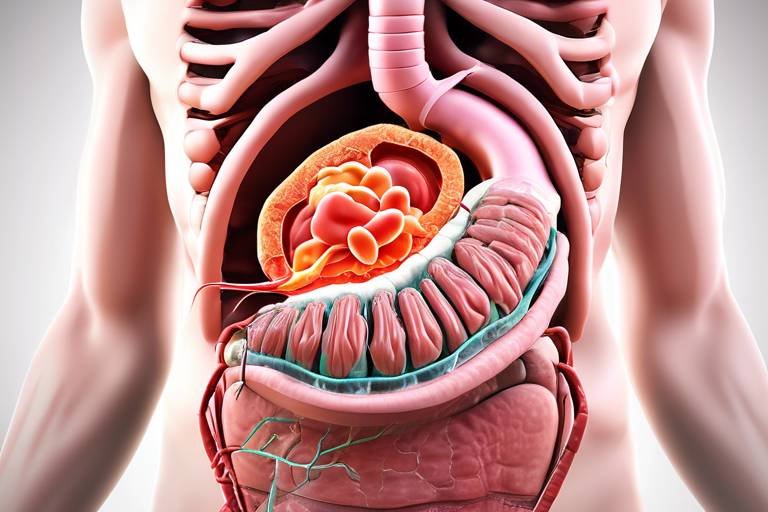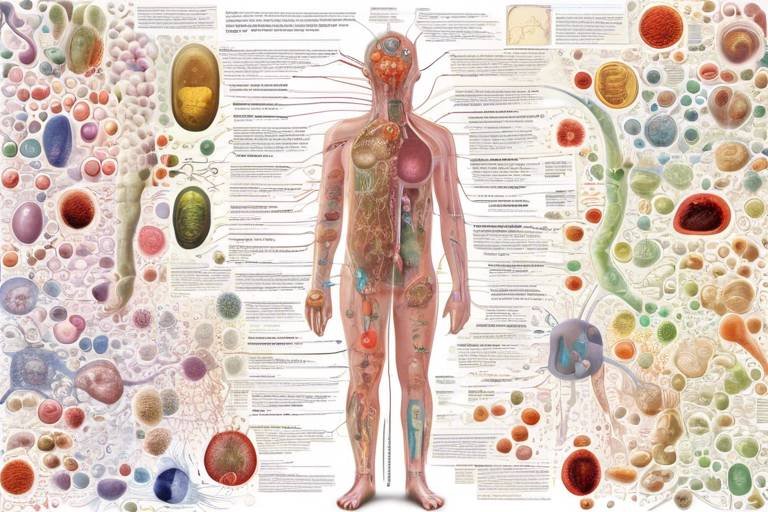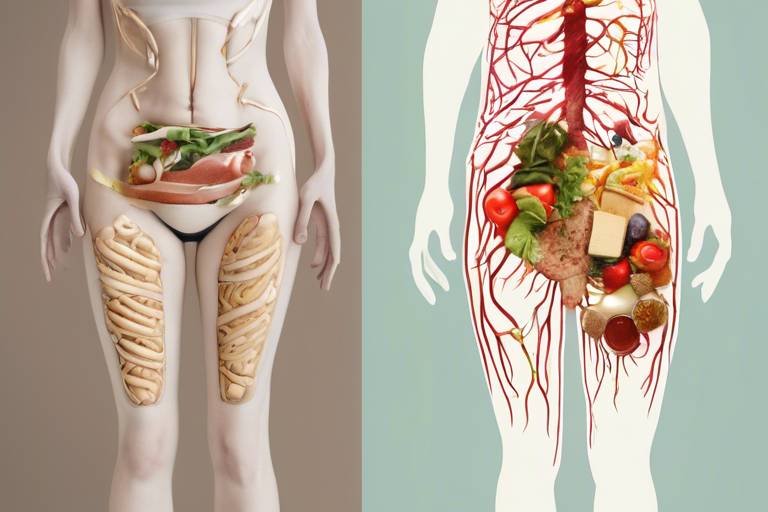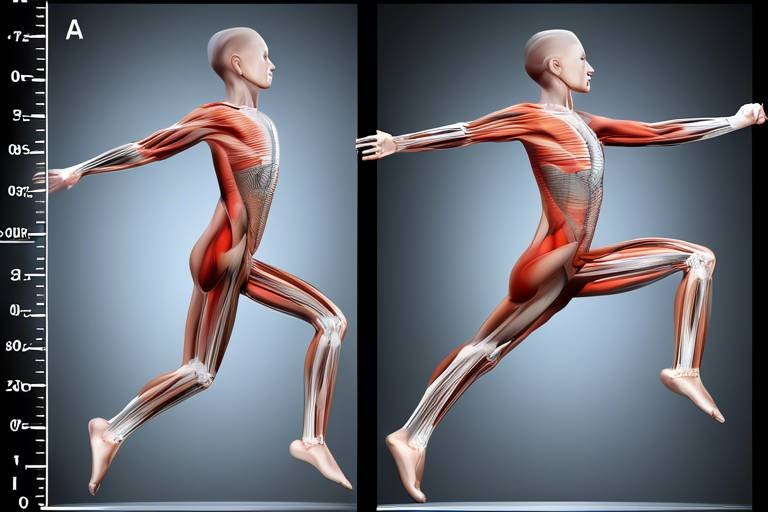The Biology of Fasting - Health Benefits Explained
Fasting is more than just skipping a meal; it's a fascinating biological process that can significantly impact your health. When we talk about fasting, we're referring to the intentional abstention from food for a defined period, which can range from hours to days. This practice has gained popularity in recent years, not just for weight loss but for its profound effects on our overall well-being. Have you ever wondered how your body reacts when you stop eating? Well, let’s dive into the science behind fasting and uncover the myriad of health benefits it offers!
At its core, fasting can take many forms, each with unique physiological implications. Some popular types of fasting include:
- Intermittent Fasting: This method alternates between periods of eating and fasting, commonly practiced in cycles such as 16/8 or 5:2.
- Extended Fasting: Involves abstaining from food for 24 hours or more, often used for deeper detoxification.
- Time-Restricted Eating: A variation of intermittent fasting, where eating is confined to a specific time window each day.
Regardless of the method, fasting triggers a cascade of biological changes. When you don’t eat, your body shifts from using glucose as its primary energy source to burning fat, leading to a state known as ketosis. This metabolic shift not only helps in weight management but also enhances the body's efficiency in energy utilization.
When you fast, your body undergoes remarkable metabolic changes. One of the most significant effects is the increase in fat oxidation. This means that your body becomes a fat-burning machine, utilizing stored fat for energy. Additionally, fasting improves insulin sensitivity, which is crucial for maintaining stable blood sugar levels. Improved insulin sensitivity means your body can manage glucose more effectively, reducing the risk of type 2 diabetes.
During fasting, your body doesn’t just stop functioning; it goes into repair mode. One of the key processes activated is autophagy, which literally means "self-eating." This process allows your cells to clean out damaged components and recycle them for energy. Think of it as a spring cleaning for your cells! By clearing out the clutter, autophagy promotes cellular health, longevity, and overall vitality.
Autophagy is vital for maintaining cellular function during fasting. It helps in the removal of dysfunctional proteins and organelles, ensuring that cells operate at peak efficiency. This process not only supports cellular health but also plays a role in the prevention of various diseases, including neurodegenerative disorders. So, when you fast, you’re not just losing weight; you’re also enhancing your cellular resilience!
Fasting may also have a profound impact on aging. By promoting autophagy and reducing oxidative stress, fasting can potentially slow down the aging process. Imagine your cells as old cars; without regular maintenance, they begin to break down. Fasting acts as that much-needed tune-up, keeping your cells in top shape and possibly extending your lifespan.
Fasting induces a variety of hormonal changes that can dramatically affect your metabolism and appetite. For instance, insulin levels drop significantly during fasting, which helps facilitate fat burning. On the other hand, levels of growth hormone can increase, which is beneficial for fat loss and muscle gain. These hormonal shifts create a favorable environment for weight management and overall health improvement.
The health benefits of fasting are extensive and multifaceted. Here are some of the key advantages:
- Weight Management: Fasting can be a powerful tool for weight loss as it helps regulate appetite and reduces overall calorie intake.
- Cardiovascular Health: Studies show that fasting can improve blood pressure, cholesterol levels, and other cardiovascular risk factors.
- Enhanced Brain Function: Fasting may boost brain health by promoting the production of brain-derived neurotrophic factor (BDNF), a protein linked to cognitive function.
Overall, fasting is not just a diet; it’s a lifestyle choice that can lead to a healthier, longer life. By understanding the biological mechanisms at play, you can harness the power of fasting to improve your health and vitality.
1. Is fasting safe for everyone?
Fasting is generally safe for most people, but it's essential to consult with a healthcare professional, especially if you have underlying health conditions.
2. How long should I fast for health benefits?
The duration of fasting can vary. Intermittent fasting methods, like the 16/8 approach, are popular and effective for many individuals.
3. Can I drink water while fasting?
Yes! Staying hydrated is crucial, and drinking water during fasting is encouraged.
4. Will fasting help me lose weight?
Yes, fasting can aid in weight loss by reducing calorie intake and improving metabolic health.
5. What should I eat when I break my fast?
It's best to break your fast with nutrient-dense foods that provide energy and essential nutrients, such as fruits, vegetables, and lean proteins.

[Understanding Fasting]
This article explores the biological mechanisms behind fasting and its various health benefits, including weight loss, improved metabolism, and potential longevity effects.
Fasting is more than just skipping meals; it's a powerful tool that can profoundly impact our health. At its core, fasting involves abstaining from food for a specific period, which can range from a few hours to several days. This practice has been around for centuries, often linked to spiritual and religious traditions, but in recent years, it has gained traction in the realm of health and wellness. So, what exactly happens to our bodies when we fast?
There are several types of fasting, each with its own unique approach and physiological implications. Some of the most popular methods include:
- Intermittent Fasting: This method alternates between periods of eating and fasting, such as the 16/8 method where you fast for 16 hours and eat during an 8-hour window.
- Extended Fasting: This involves fasting for longer periods, typically 24 hours or more, allowing the body to enter deeper metabolic states.
- Alternate-Day Fasting: This approach alternates between fasting days and regular eating days, which can help in weight management.
Regardless of the method, the physiological implications are profound. When we fast, our bodies undergo a series of metabolic changes. Initially, our body uses up glycogen stores for energy, but as fasting continues, it shifts to burning fat for fuel, which is a process known as fat oxidation. This not only aids in weight loss but also enhances the body’s ability to utilize energy efficiently.
Fasting also impacts our hormonal balance. For instance, insulin levels drop significantly, which promotes fat burning and improves insulin sensitivity. This is crucial because high insulin levels can lead to various metabolic disorders. Additionally, fasting stimulates the release of growth hormone, which plays a vital role in muscle maintenance and fat metabolism.
In essence, fasting is like hitting the reset button on our metabolic processes. It encourages our bodies to become more adaptable and efficient, much like how a car runs smoother after a thorough tune-up. By understanding the different types of fasting and their implications, we can harness the benefits of this ancient practice to enhance our modern lifestyles.
Fasting triggers significant metabolic changes, including increased fat oxidation and improved insulin sensitivity. Here, we delve into how fasting alters energy utilization in the body.
During fasting, the body initiates cellular repair processes, including autophagy. This subheading discusses how autophagy contributes to cellular health and longevity.
Autophagy is a vital process for recycling cellular components. This section highlights its importance in maintaining cellular function during fasting.
Fasting may influence aging by promoting autophagy and reducing oxidative stress. Here, we explore the potential anti-aging effects of fasting.
Fasting induces various hormonal changes that affect metabolism and appetite. This section examines how hormones like insulin and growth hormone respond to fasting.
Fasting offers numerous health benefits, including weight loss, improved heart health, and enhanced brain function. This section outlines these advantages in detail.
Fasting can be an effective strategy for weight loss and management. Here, we discuss how it helps regulate appetite and calorie intake.
Fasting has been linked to improved cardiovascular health markers. This subheading explores how fasting influences blood pressure, cholesterol levels, and overall heart health.
Q: Is fasting safe for everyone?
A: While fasting can offer numerous health benefits, it may not be suitable for everyone, especially those with certain medical conditions. It's always best to consult with a healthcare provider before starting any fasting regimen.
Q: Can I drink water while fasting?
A: Yes, staying hydrated is crucial during fasting. Water, black coffee, and herbal teas are generally acceptable.
Q: How long should I fast for optimal benefits?
A: The duration of fasting can vary based on individual goals and methods. Intermittent fasting methods like 16/8 are a great starting point for many people.

[Metabolic Effects of Fasting]
Fasting is not just about skipping meals; it's a powerful tool that triggers a cascade of metabolic changes in the body. When you abstain from food for a certain period, your body shifts from using glucose as its primary energy source to utilizing fat. This process is called fat oxidation, and it plays a crucial role in weight management and overall health. Imagine your body as a hybrid car that can switch between gas and electric; during fasting, it opts for the more efficient fuel—fat. This shift can lead to significant weight loss, improved metabolic rates, and a host of other health benefits.
One of the most fascinating aspects of fasting is its impact on insulin sensitivity. Insulin is a hormone that helps regulate blood sugar levels, and when we eat frequently, our bodies can become resistant to its effects. This resistance can lead to various health issues, including type 2 diabetes. However, fasting has been shown to enhance insulin sensitivity, allowing your body to use insulin more effectively. In fact, studies suggest that intermittent fasting can lower insulin levels by up to 30-50%, which is a game-changer for metabolic health.
Moreover, fasting has a profound effect on energy utilization. When you fast, your body begins to conserve energy and optimize its use. It becomes more efficient in burning fat for fuel, which not only aids in weight loss but also improves overall energy levels. Think of your body as a finely-tuned machine; it learns to operate more efficiently when it’s not constantly being fueled, allowing for better performance in daily activities.
During fasting, your body also experiences a decrease in levels of growth hormone, which plays a critical role in fat metabolism and muscle growth. Interestingly, studies indicate that fasting can actually increase growth hormone levels by as much as 5-fold after just a short fasting period. This increase helps preserve lean muscle mass while the body is in a caloric deficit, making fasting an attractive option for those looking to lose weight without sacrificing muscle.
Additionally, fasting impacts metabolic rate. Research has shown that short-term fasting can increase your metabolic rate by up to 14%, helping you burn more calories throughout the day. This effect is particularly beneficial for those looking to shed pounds or maintain a healthy weight. However, it’s essential to approach fasting with caution and to listen to your body, as prolonged fasting can lead to adverse effects.
In summary, the metabolic effects of fasting are profound and multifaceted. By shifting energy utilization from glucose to fat, enhancing insulin sensitivity, and increasing growth hormone levels, fasting can transform how your body processes food and energy. It's a remarkable strategy that not only aids in weight loss but also contributes to better metabolic health overall.
- What is the best type of fasting for beginners? Intermittent fasting, such as the 16/8 method, is often recommended for beginners as it allows for a manageable eating window.
- Can fasting help with weight loss? Yes, fasting can help regulate appetite and reduce calorie intake, leading to effective weight loss.
- Is fasting safe for everyone? While fasting is safe for many, individuals with certain health conditions should consult a healthcare provider before starting.
- How long should I fast for optimal benefits? The duration of fasting can vary, but many find success with 16-24 hour fasts a few times a week.

[Cellular Repair Mechanisms]
When we talk about fasting, it’s not just about skipping meals; it’s about unleashing a powerhouse of biological processes that can lead to remarkable health benefits. One of the most fascinating aspects of fasting is its ability to kickstart cellular repair mechanisms. During fasting periods, your body enters a state where it begins to repair and rejuvenate itself at the cellular level, promoting overall well-being.
One of the key processes activated during fasting is autophagy. Think of autophagy as your body’s internal cleaning crew, sweeping away damaged components and recycling them for energy. This is particularly crucial because, as we age, our cells accumulate waste and damaged proteins, which can hinder their function. By engaging in fasting, we essentially give our cells a chance to hit the reset button, enhancing their efficiency and longevity.
But how does this all work? When you fast, your body experiences a decrease in insulin levels, which signals cells to begin the autophagic process. During this time, cells can break down and remove dysfunctional proteins and organelles. This process not only cleans up the cellular environment but also provides the necessary building blocks for new cellular components. It’s like a renovation project for your cells, where old, tired structures are replaced with fresh, new ones.
Moreover, autophagy is linked to several health benefits, including:
- Enhanced cellular function: By removing damaged components, cells can operate more efficiently, leading to better overall health.
- Reduced inflammation: Autophagy helps in modulating the immune response, which can decrease chronic inflammation—a contributor to many diseases.
- Longevity: Studies suggest that enhanced autophagy may be associated with increased lifespan, as it helps maintain cellular integrity over time.
Another important aspect of cellular repair during fasting is the activation of stress response pathways. These pathways help cells adapt to stressors, such as nutrient deprivation. When you fast, your cells ramp up their production of protective proteins that help mitigate damage from oxidative stress, which is a major player in aging and various diseases. This cellular resilience is crucial for maintaining health as we age.
In summary, the cellular repair mechanisms activated during fasting, particularly autophagy, play a vital role in maintaining cellular health and function. By engaging in fasting, you’re not just giving your digestive system a break; you’re also empowering your cells to rejuvenate and thrive. It’s a fascinating interplay of biology that highlights the profound impact of fasting on our overall health.
Q: How long should I fast to see benefits?
A: The duration of fasting can vary based on individual goals and health conditions. Intermittent fasting, which typically involves fasting for 16 hours a day, is a popular method that many find effective.
Q: Can fasting help with weight loss?
A: Yes, fasting can be an effective tool for weight loss as it helps regulate appetite and calorie intake, leading to a natural reduction in body weight.
Q: Is fasting safe for everyone?
A: While fasting can offer numerous health benefits, it may not be suitable for everyone. It’s important to consult with a healthcare professional before starting any fasting regimen, especially for individuals with underlying health conditions.

[Role of Autophagy]
Autophagy, a term that literally means "self-eating," is a fascinating process that plays a crucial role in maintaining cellular health. Imagine your body as a bustling city, where each cell is a building that needs regular maintenance to ensure everything runs smoothly. Just as a city requires waste management to keep it clean and functional, our cells rely on autophagy to recycle damaged components and remove harmful debris. This process becomes particularly important during fasting, as the body shifts its focus from digestion to repair and regeneration.
When you fast, your body enters a state of energy conservation. During this time, autophagy kicks into high gear, breaking down unnecessary or dysfunctional cellular parts and repurposing them for energy. This is akin to a city using its old materials to build new infrastructure instead of waiting for new supplies. By recycling these components, autophagy not only provides energy but also prevents the accumulation of toxic proteins, which can lead to various diseases.
The role of autophagy in cellular health is multifaceted. Here are some key functions it performs during fasting:
- Cellular Repair: Autophagy helps repair damaged organelles, ensuring that cells function optimally.
- Detoxification: It clears out misfolded proteins and other cellular waste, reducing the risk of cellular dysfunction.
- Energy Regulation: By breaking down cellular components, autophagy provides essential energy during periods of fasting.
Additionally, research has shown that enhanced autophagy can lead to improved longevity. In animal studies, increased autophagy has been linked to a longer lifespan, suggesting that this cellular cleanup crew may be a key player in the aging process. By promoting the turnover of cellular components, autophagy can help mitigate the effects of aging and reduce the risk of age-related diseases.
Overall, the role of autophagy during fasting is vital for maintaining cellular homeostasis and promoting overall health. By embracing fasting as a lifestyle choice, individuals can harness the power of autophagy to not only enhance their physical well-being but also to potentially extend their lifespan. So, the next time you consider skipping a meal, remember that your body might just be gearing up for some much-needed self-repair.

[Impact on Aging]
The relationship between fasting and aging is a fascinating topic that has gained considerable attention in recent years. As we age, our bodies undergo various changes, and the quest for longevity becomes increasingly important. Fasting, as a practice, has shown promise in influencing these aging processes positively. One of the most significant ways fasting impacts aging is through its ability to promote autophagy, a natural cellular repair mechanism that helps clear out damaged cells and regenerate new ones. Imagine your body as a well-maintained garden; just as a gardener prunes dead branches to encourage new growth, autophagy removes the cellular debris that accumulates over time, allowing for rejuvenation.
Moreover, fasting has been linked to a reduction in oxidative stress, which is often a significant contributor to the aging process. Oxidative stress occurs when there is an imbalance between free radicals and antioxidants in the body. By practicing fasting, you can help lower the levels of these harmful free radicals, much like how a filter cleans impurities from water. This reduction in oxidative stress not only contributes to healthier cells but also supports overall bodily functions, potentially leading to a longer, healthier life.
Research indicates that intermittent fasting can activate certain genes related to longevity, particularly those involved in stress resistance and metabolic regulation. For instance, the SIRT1 gene, known for its role in regulating cellular health, is activated during fasting. This gene is often referred to as the "longevity gene" because of its association with increased lifespan in various organisms. By activating such genes, fasting may create a favorable environment for cellular repair and regeneration, ultimately slowing down the aging process.
Additionally, fasting can improve metabolic health, which is crucial as we age. As our metabolism slows, we become more susceptible to weight gain, diabetes, and other metabolic disorders. Fasting helps to enhance insulin sensitivity and reduce inflammation, both of which are vital in maintaining a healthy metabolism. This improvement can be likened to tuning a musical instrument; just as a finely tuned instrument produces beautiful music, a well-functioning metabolism can lead to a harmonious state of health.
In summary, the impact of fasting on aging is multifaceted and promising. By promoting autophagy, reducing oxidative stress, activating longevity genes, and improving metabolic health, fasting could play a pivotal role in enhancing our lifespan and quality of life. As we continue to explore the science behind fasting, it becomes increasingly clear that this ancient practice holds significant potential for modern health and longevity.
- What is autophagy? Autophagy is a process where the body cleans out damaged cells and regenerates new ones, contributing to cellular health.
- How does fasting reduce oxidative stress? Fasting helps balance free radicals and antioxidants in the body, thereby lowering oxidative stress levels.
- Can fasting really increase lifespan? Research suggests that fasting may activate longevity-related genes, potentially leading to a longer life.
- Is fasting safe for everyone? While many people can benefit from fasting, it's essential to consult with a healthcare provider before starting any fasting regimen, especially for those with underlying health conditions.

[Hormonal Changes]
When we talk about fasting, one of the most fascinating aspects to consider is the hormonal changes that occur in our bodies. These changes can significantly impact our metabolism, appetite, and overall health. Think of hormones as the body's little messengers, communicating vital information to different organs and systems. When we abstain from food, these messengers start to work overtime, adjusting their signals to help us adapt to the lack of incoming calories.
One of the primary hormones affected by fasting is insulin. Typically, insulin levels rise after we eat, helping to transport glucose from the bloodstream into our cells for energy or storage. However, during fasting, insulin levels drop, which promotes fat burning. Lower insulin levels mean that the body can more effectively utilize stored fat as energy, making fasting a powerful tool for weight management.
Additionally, fasting triggers an increase in growth hormone levels, which plays a crucial role in fat metabolism and muscle preservation. Research shows that fasting can elevate growth hormone levels by as much as five-fold! This increase not only aids in fat burning but also helps maintain lean muscle mass, which is essential for a healthy metabolism.
Another hormone that undergoes significant changes during fasting is ghrelin, often referred to as the "hunger hormone." Ghrelin levels typically rise when we are hungry, signaling to our brains that it's time to eat. Interestingly, during fasting periods, ghrelin levels can fluctuate, leading to a temporary increase in hunger followed by a decrease as the body adapts. This adaptation can help some individuals manage their appetite more effectively over time.
Moreover, fasting influences leptin, the hormone responsible for signaling satiety. When we fast, leptin levels can drop, which may initially trigger hunger but ultimately leads to improved sensitivity to this hormone. As a result, individuals may find that they feel fuller more quickly after eating, aiding in weight management.
To summarize, the hormonal landscape during fasting is dynamic and multifaceted. Here’s a quick overview of the key hormones involved:
| Hormone | Effect During Fasting |
|---|---|
| Insulin | Decreases, promoting fat burning |
| Growth Hormone | Increases, aiding fat metabolism and muscle preservation |
| Ghrelin | Fluctuates, initially increases hunger then stabilizes |
| Leptin | Decreases, improves sensitivity to satiety signals |
Understanding these hormonal changes can empower individuals to make informed decisions about their fasting practices. By recognizing how fasting affects our hormones, we can better appreciate its potential benefits for weight management and overall health. So, the next time you consider skipping a meal or trying a fasting regimen, remember that your hormones are working hard behind the scenes to help you adapt and thrive!
- What is fasting? Fasting is the voluntary abstention from food for a specific period.
- How does fasting affect insulin levels? Fasting lowers insulin levels, which promotes fat burning.
- Can fasting help with weight loss? Yes, fasting can be an effective strategy for weight loss by regulating appetite and calorie intake.
- Is fasting safe for everyone? While fasting can be beneficial, it's essential to consult with a healthcare professional, especially if you have underlying health conditions.

[Health Benefits of Fasting]
Fasting is more than just a trendy diet; it’s a powerful tool that can unlock a treasure trove of health benefits. Imagine giving your body a break from constant digestion, allowing it to focus on repair and rejuvenation. This is where the magic of fasting comes into play! Many studies have shown that fasting can lead to impressive results, from weight loss to improved heart health and even enhanced brain function. But how does it all work? Let’s dive deeper into the remarkable health benefits that fasting can offer.
One of the most significant advantages of fasting is its impact on weight management. When you fast, your body shifts from burning glucose (sugar) for energy to burning stored fat. This not only helps in shedding those extra pounds but also aids in maintaining a healthy weight over time. Think of it as a reset button for your metabolism! By regulating hormones that control appetite, such as leptin and ghrelin, fasting can help you feel fuller for longer periods, making it easier to resist those pesky cravings.
But the benefits don’t stop there. Fasting has also been linked to improved cardiovascular health. Research suggests that intermittent fasting can lead to lower blood pressure, reduced cholesterol levels, and decreased inflammation in the body. These changes can significantly lower your risk of heart disease, which is a leading cause of death worldwide. To put it simply, fasting can help keep your heart ticking like a well-oiled machine!
Moreover, fasting has shown promising effects on brain function. During fasting, the brain produces a protein called brain-derived neurotrophic factor (BDNF), which plays a crucial role in promoting the survival of neurons. Higher levels of BDNF are associated with improved memory and learning abilities. So, if you’re looking to boost your brainpower, skipping a meal might just be the secret ingredient you need!
Additionally, fasting can enhance your body's insulin sensitivity. Improved insulin sensitivity means your body can manage blood sugar levels more effectively, reducing the risk of type 2 diabetes. This is particularly beneficial for individuals who struggle with insulin resistance. By giving your body a break from constant food intake, you allow it to recalibrate its response to insulin, leading to better overall health.
In summary, the health benefits of fasting are vast and varied. From weight loss and improved heart health to enhanced brain function and better insulin sensitivity, fasting can be a game-changer for many individuals. It’s like giving your body a chance to hit the refresh button, allowing it to heal and thrive. If you’re considering incorporating fasting into your lifestyle, it’s essential to approach it mindfully and listen to your body’s needs. After all, health is a journey, not a race!
- What is fasting? Fasting is the voluntary abstention from food for a specific period, allowing the body to focus on repair and metabolic processes.
- How does fasting help with weight loss? Fasting shifts the body's energy source from glucose to stored fat, promoting weight loss and appetite regulation.
- Is fasting safe for everyone? While fasting can be beneficial, it’s essential to consult with a healthcare professional, especially for those with underlying health conditions.
- Can fasting improve mental clarity? Yes! Fasting can stimulate the production of BDNF, which enhances brain function and cognitive abilities.

[Weight Management]
When it comes to weight management, fasting has emerged as a powerful tool that many people are turning to. The concept might seem daunting at first—after all, the idea of abstaining from food sounds like a recipe for hunger pangs and fatigue. However, the reality is far more nuanced and beneficial. Fasting, particularly intermittent fasting, can help regulate appetite and calorie intake, making it easier to achieve and maintain a healthy weight.
One of the primary ways fasting aids in weight management is through its impact on hormones that regulate hunger. When you fast, your body experiences a decrease in insulin levels, which not only encourages fat burning but also helps to reduce hunger signals. This can lead to a natural decrease in calorie consumption, as you may find yourself feeling less hungry during eating windows. Think of it as giving your body a break from constant digestion, allowing it to focus on burning stored fat instead.
Moreover, fasting can enhance the body's ability to utilize fat for energy. During periods without food, the body shifts from using glucose as its primary energy source to burning fat, which can accelerate weight loss. This metabolic switch is akin to switching from a gas-powered engine to an electric one—suddenly, you're using a cleaner, more efficient source of energy. This transition can also lead to improved energy levels and mental clarity, making the fasting experience more enjoyable.
To illustrate the effectiveness of fasting in weight management, consider the following table that highlights the differences in metabolic responses between regular eating patterns and intermittent fasting:
| Aspect | Regular Eating | Intermittent Fasting |
|---|---|---|
| Insulin Levels | Higher, leading to fat storage | Lower, promoting fat burning |
| Hunger Hormones (Ghrelin) | Often elevated | Regulated, leading to decreased hunger |
| Energy Source | Primarily glucose | Fat as the primary source |
| Caloric Intake | Consistent, often excessive | Reduced, promoting weight loss |
Additionally, fasting can help develop a healthier relationship with food. By creating structured eating patterns, individuals may find that they are more mindful of their food choices during eating windows. This mindfulness can lead to better food selections, such as opting for nutrient-dense foods over processed snacks, further aiding in weight management.
It's important to note that while fasting can be an effective strategy for many, it isn't a one-size-fits-all solution. Individual responses to fasting can vary based on factors like age, lifestyle, and overall health. Therefore, it’s advisable to approach fasting with a plan and possibly consult a healthcare professional to tailor the method to your specific needs.
In summary, fasting offers a unique approach to weight management by harnessing the body's natural metabolic processes. Through hormonal regulation and a shift in energy utilization, fasting can not only assist in shedding unwanted pounds but also promote a healthier lifestyle overall. So, if you're considering this journey, remember that it’s not just about weight loss; it’s about achieving a balanced and sustainable way of living.
- What is intermittent fasting? Intermittent fasting is an eating pattern that cycles between periods of fasting and eating.
- Can anyone try fasting? While fasting can be beneficial, it's best to consult a healthcare provider, especially for individuals with certain health conditions.
- How long should I fast? The duration can vary; popular methods include 16/8 (16 hours fasting, 8 hours eating) and 5:2 (eating normally for 5 days and restricting calories for 2 days).
- Will I feel hungry while fasting? Some initial hunger is normal, but many find that it decreases over time as their body adjusts.

[Cardiovascular Health]
When it comes to taking care of our heart, many of us often overlook the profound impact that fasting can have on cardiovascular health. Imagine your heart as a finely-tuned engine; if you don’t give it the right fuel or allow it periods of rest, it can start to sputter. Fasting acts like a well-deserved pit stop for your heart, allowing it to recalibrate and function more efficiently. Research has demonstrated that fasting can lead to improved cardiovascular markers, such as lower blood pressure, reduced cholesterol levels, and enhanced heart function.
One of the primary ways fasting benefits cardiovascular health is through its effect on blood pressure. Studies have shown that intermittent fasting can lead to significant reductions in both systolic and diastolic blood pressure. This is crucial because high blood pressure is a major risk factor for heart disease. By giving your body a break from constant digestion, fasting allows your blood vessels to relax and reduces the strain on your heart.
Moreover, fasting has a remarkable effect on cholesterol levels. When you fast, your body shifts from using glucose as its primary energy source to utilizing stored fat. This metabolic shift not only promotes fat oxidation but also leads to a decrease in bad cholesterol (LDL) and an increase in good cholesterol (HDL). A healthy balance of these cholesterol types is essential for maintaining a clear circulatory system and reducing the risk of atherosclerosis, a condition where arteries become clogged with fatty deposits.
Additionally, fasting can enhance your body's insulin sensitivity. When insulin levels are kept in check, the risk of developing insulin resistance—a precursor to type 2 diabetes and heart disease—is significantly lowered. Improved insulin sensitivity means that your body can manage blood sugar levels more effectively, reducing the likelihood of inflammation, which is a contributor to cardiovascular disease.
But how does fasting actually influence these changes? The answer lies in the body's ability to adapt during periods without food. When you fast, your body enters a state of ketosis, where it starts to burn fat for fuel instead of carbohydrates. This process not only provides energy but also produces ketones, which have been shown to have protective effects on the heart. Ketones can reduce inflammation and oxidative stress, both of which are key players in the development of cardiovascular diseases.
To summarize, the cardiovascular benefits of fasting are numerous and multifaceted. Here’s a quick overview of how fasting can positively impact heart health:
| Benefit | Explanation |
|---|---|
| Lower Blood Pressure | Reduces strain on the heart by allowing blood vessels to relax. |
| Improved Cholesterol Levels | Decreases LDL and increases HDL cholesterol for better heart health. |
| Enhanced Insulin Sensitivity | Helps in managing blood sugar levels and reducing inflammation. |
| Reduced Inflammation | Fasting lowers oxidative stress, protecting the heart from damage. |
In conclusion, fasting isn't just a trend; it’s a powerful tool for enhancing cardiovascular health. By embracing this practice, you’re not only giving your body a break but also supporting your heart in ways you might never have imagined. So, why not give it a try? Your heart will thank you!
- What is fasting? Fasting is the voluntary abstention from food and drink for a specific period.
- How does fasting improve heart health? Fasting can lower blood pressure, improve cholesterol levels, and enhance insulin sensitivity.
- Is fasting safe for everyone? While fasting can be beneficial, it may not be suitable for everyone. It's best to consult a healthcare professional before starting any fasting regimen.
- How long should I fast for cardiovascular benefits? Intermittent fasting protocols, such as 16:8 or 5:2, are commonly recommended for health benefits, including heart health.
Frequently Asked Questions
- What is fasting, and how does it work?
Fasting is the practice of abstaining from food for a certain period. It triggers various biological processes that can lead to improved metabolism and health benefits. When you fast, your body shifts from using glucose for energy to burning fat, which can help with weight loss and metabolic health.
- Are there different types of fasting?
Absolutely! There are several types of fasting, including intermittent fasting, where you cycle between eating and fasting periods, and prolonged fasting, which lasts for longer durations. Each type has its own physiological effects, but they all share the common goal of enhancing health and wellness.
- What are the metabolic effects of fasting?
Fasting can significantly alter your metabolism by increasing fat oxidation and improving insulin sensitivity. This means your body becomes more efficient at burning fat for energy and managing blood sugar levels, which is crucial for weight management and overall health.
- How does fasting promote cellular repair?
During fasting, your body initiates a process called autophagy, which is like a spring cleaning for your cells. It helps remove damaged components and recycle them for energy, promoting cellular health and potentially extending longevity.
- Can fasting affect aging?
Yes, fasting may influence the aging process by promoting autophagy and reducing oxidative stress. This can lead to healthier cells and potentially slow down the effects of aging, making fasting an interesting area of research for longevity.
- What hormonal changes occur during fasting?
Fasting triggers various hormonal changes, including increased levels of growth hormone and reduced insulin levels. These changes can enhance fat burning, regulate appetite, and improve overall metabolic health.
- What health benefits can I expect from fasting?
Fasting can lead to numerous health benefits, such as effective weight management, improved heart health, and enhanced brain function. Many people experience better focus and mental clarity during fasting periods, in addition to physical health improvements.
- Is fasting safe for everyone?
While fasting can be beneficial for many, it's not suitable for everyone. Individuals with certain medical conditions, pregnant or breastfeeding women, and those with a history of eating disorders should consult a healthcare professional before starting any fasting regimen.



















